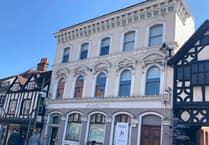THE family of a 96-year-old woman from Alton are demanding an answer from the Hampshire Hospitals NHS Foundation Trust over the level of care of elderly patients on E Ward at Basingstoke Hospital.
They have registered a formal complaint after Audrey Palmer suffered yet another fall while undergoing treatment for cancer at North Hampshire Hospital in Basingstoke – a fall that broke her hip.
The incident happened on the night of Audrey’s 96th birthday on April 24 when, according to eldest son Paul Vychodil, the family had been to see Audrey with cake and gifts, but with increasing concern for her well-being.
The party included Audrey’s daughter, Tasha, who had come over from Germany to be with her mother while she was in hospital, and her granddaughter. They were all left shocked by the state of the wards and the apparent lack of care shown to elderly patients, many of whom seemed to have little or no family support.
According to Audrey’s family it was not only them but other visitors who described the state of the wards on E floor as “scandalous”.
Mr Vychodil spoke of having to clean down wheelchairs with antibacterial wipes before they felt able to take Audrey out “to get away from the filthy, smelly ward”, but also of staff failing to answer emergency bells, patients “left to lie in urine-soaked beds and soiled nightwear”, of dirty floors, sticky tables and dirty cups.
“In short, the wards are dirty – full stop,” said Mr Vychodil.
An amazingly strong and resilient woman, despite failing eyesight, Audrey had, until the beginning of this year, led an independent life, living in a bungalow and caring in part for her youngest son. Born in April 1921, and now a great-grandmother, Audrey is well travelled, survived the Second World War, and has brought up a large family.
But last year she began to suffer from ill health. She had a series of falls, one of which broke her wrist. A care package was set up for her at home but ended after six weeks. A week or so later, Audrey had another fall at night but was not found until the following morning. By this time she had been diagnosed with kidney cancer and she ended up back in hospital.
Another six-week home care package ensued after which Audrey had another fall and was found in the morning covered in blood. Two days later, a similar incident resulted in an emergency call to the paramedics and Audrey’s own GP, who insisted she return to hospital where she was given a blood transfusion.
The family was advised to visit and Tasha got on the first plane from Germany to be with her mum. That was two months ago, since when Audrey, now frail, has suffered at least one other fall when being helped to the bathroom but, according to Mr Vychodil, he could not get a satisfactory explanation from the nursing staff as to how this had happened.
A family meeting was set up with the registrar, the matron and a social worker where, according to Mr Vychodil, the hospital staff were trying to argue that there had obviously been “a misunderstanding” over the fall which, Mr Vychodil insisted, “should not have happened while under your (NHS) care”.
The crunch came, however, on the day of the birthday. Clear that Audrey could no longer manage at home, there had been good news after she was accepted as a resident of a nursing home in Liphook, where the family hoped she could end her days in a comfortable and caring rural setting.
But that night, having failed to attract the attention of the nursing staff, Audrey had managed to get out of bed to take herself to the toilet but fell.
While, according to Mr Vychodil, the on-duty doctor had thought she was “okay” it was only on the insistence of the family that she was taken for an X-ray some 12 hours later, when she was found to have a broken hip.
The delay was blamed on “staff shortages and a lot of agency staff”, said Mr Vychodil, whose mother was eventually operated on that Thursday, having endured “considerable pain” and with the family fearing that she might not survive the trauma.
As a result of the surgery, Audrey has been transferred to D Ward where the care and surroundings are “the complete opposite of E Ward,” said Mr Vychodil.
Hampshire Hospitals NHS Foundation Trust chief executive Alex Whitfield confirmed: “We are in contact with the family to understand their concerns and are looking into what could have been done differently. We have an active and rigorous falls-prevention programme in place across our hospitals and each incident is thoroughly investigated.
“Patient care is at the heart of what we do at Hampshire Hospitals NHS Foundation Trust. Our staff work very hard to provide the highest levels of care and cleanliness for our patients. We are constantly striving to improve and we welcome feedback from patients and visitors when they feel that we have not lived up to our own high standards.”





Comments
This article has no comments yet. Be the first to leave a comment.